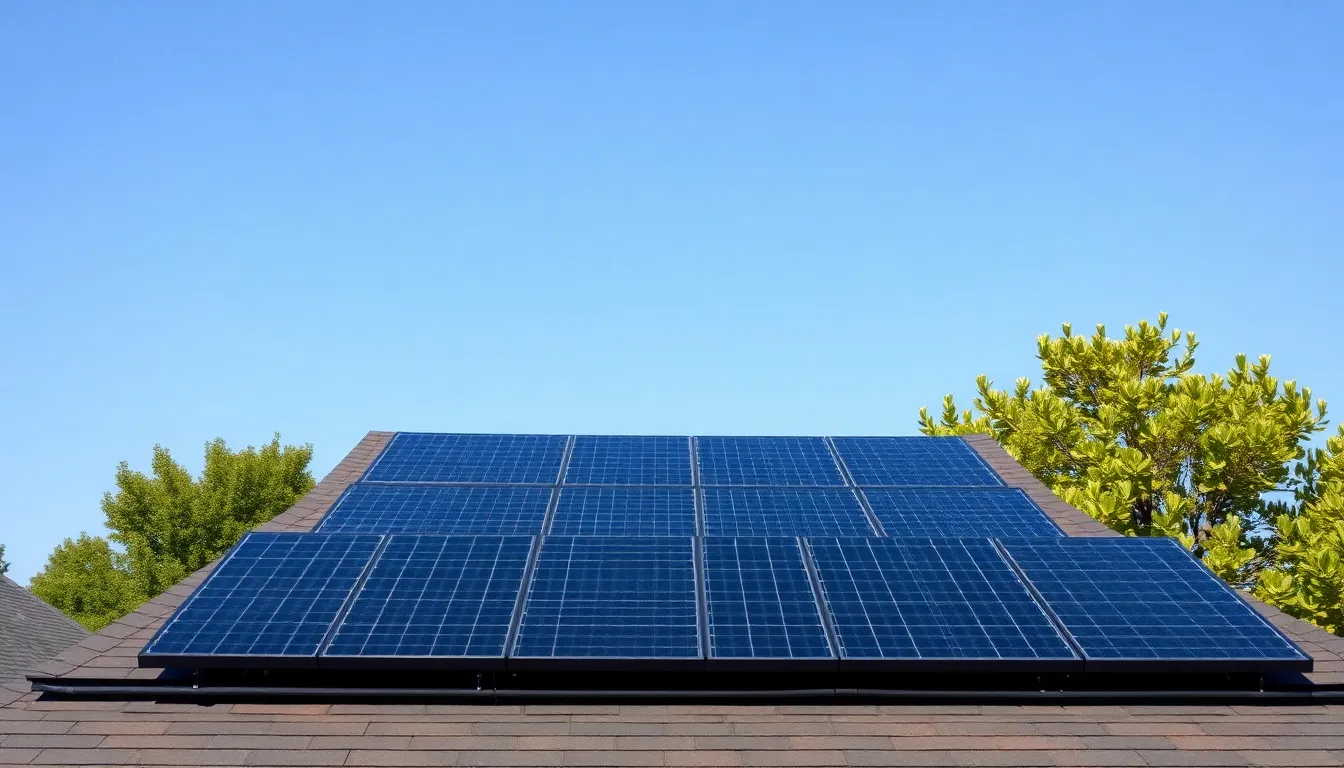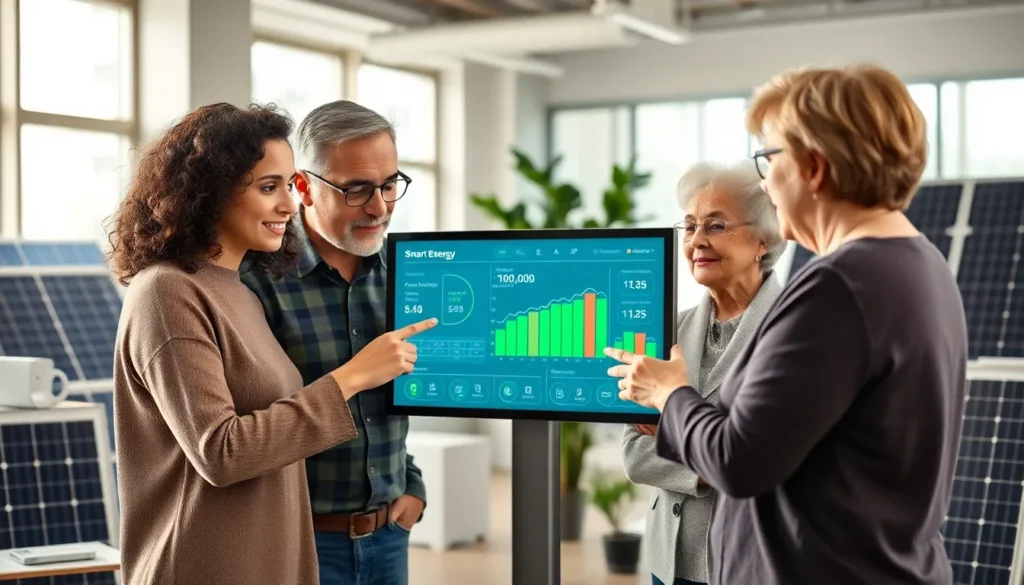Table of Contents
ToggleIn an era where sustainability and efficiency are paramount, smart energy management is transforming how individuals and businesses consume energy. This innovative approach leverages technology to optimize energy use, reduce costs, and minimize environmental impact. By integrating smart devices and data analytics, users can gain real-time insights into their energy consumption patterns.
As energy demands rise, the need for effective management solutions becomes increasingly critical. Smart energy management not only empowers users to make informed decisions but also supports the transition toward renewable energy sources. With the right tools and strategies, everyone can contribute to a greener future while enjoying the benefits of lower energy bills and enhanced efficiency.
Overview of Smart Energy Management
Smart energy management combines advanced technologies, data analytics, and smart devices to optimize energy usage across various settings. It improves energy efficiency by monitoring and controlling consumption in real time.
Organizations and households benefit from data-driven insights, allowing them to identify energy-saving opportunities. Users can leverage smart thermostats, energy management systems, and other devices to automate processes, leading to significant savings.
The integration of renewable energy sources enhances smart energy management efforts. Systems designed for smart energy management facilitate the seamless incorporation of solar and wind, contributing to lower emissions and a reduced carbon footprint.
Decentralized energy systems enable users to generate, store, and utilize energy efficiently. These systems often include features like demand-response capabilities, allowing users to manage loads dynamically.
Adopting smart energy management practices not only leads to financial savings but also fosters a sustainable environment. The emphasis on efficiency and renewable integration positions smart energy management as a vital component in the transition toward greener energy solutions.
Importance of Smart Energy Management

Smart energy management plays a crucial role in promoting sustainable practices and efficiency for individuals and organizations. Understanding its benefits is essential for fostering a more resilient energy future.
Environmental Benefits
Environmental advantages of smart energy management include substantial reductions in greenhouse gas emissions. By optimizing energy use, households and businesses lower their carbon footprints. Smart technologies, like smart grids and energy-efficient appliances, reduce reliance on fossil fuels. Additionally, integrating renewable energy sources, such as solar panels, enhances these benefits by supplying clean energy and minimizing environmental degradation. Efficient energy management also promotes biodiversity conservation through reduced resource depletion, supporting ecosystems.
Economic Advantages
Economic benefits stem from lower energy costs and increased operational efficiency. Smart energy management systems identify energy-saving opportunities, leading to significant savings on utility bills. For example, businesses implementing smart technology can reduce energy consumption by up to 30%, according to the U.S. Department of Energy. Furthermore, energy-efficient practices often qualify for tax incentives and rebates, improving the financial outlook for users. Decentralized energy sources, like rooftop solar, generate additional savings while providing energy independence, minimizing vulnerability to fluctuating energy markets. These economic advantages enhance competitiveness, particularly for businesses aiming for sustainability in their operations.
Components of Smart Energy Management Systems
Smart energy management systems comprise several key components that work together to optimize energy usage effectively. These components include smart meters, energy management software, and renewable energy integration.
Smart Meters
Smart meters provide real-time data on energy consumption, enabling users to track usage patterns accurately. These devices send energy data directly to utilities, allowing for more precise billing and improved demand forecasting. Equipped with features like remote monitoring, smart meters facilitate timely alerts for unusual consumption spikes, helping users identify potential issues. With advanced analytics capabilities, users can better understand trends and make informed decisions about adjusting energy usage.
Energy Management Software
Energy management software serves as a central hub for data analysis and reporting. This software consolidates information from various sources, allowing for comprehensive energy monitoring and control. Users gain access to dashboards that visualize energy consumption, cost savings, and sustainability impacts. Additionally, automation features enable users to create schedules for appliances, optimizing energy consumption patterns. The software can also generate reports that track energy performance over time, facilitating continuous improvement strategies.
Renewable Energy Integration
Renewable energy integration plays a crucial role in smart energy management systems. This component allows users to incorporate energy sources such as solar and wind into their energy supply mix. With real-time monitoring, users can assess their renewable energy generation and consumption, optimizing usage to maximize self-sufficiency. Energy storage solutions further enhance this integration, enabling users to store excess energy for later use. By adopting renewable energy, users contribute to reducing their carbon footprint while reaping financial benefits through lower energy costs.
Challenges in Implementing Smart Energy Management
Implementing smart energy management systems presents various challenges that can impede progress. These challenges include initial investment costs and data privacy concerns.
Initial Investment
Initial investment represents a significant barrier for many organizations and households. High upfront costs for advanced technologies, smart devices, and installation often require careful budgeting. For instance, the installation of smart meters and energy management software can range from $300 to $1,200, depending on the complexity of the system. Additionally, the potential return on investment may not materialize immediately, leading to hesitance in adopting smart energy management solutions. Organizations may also face a skills gap, requiring training for staff to effectively utilize these systems, further increasing initial costs.
Data Privacy Concerns
Data privacy concerns remain a critical issue related to smart energy management. Technologies rely on extensive data collection about energy usage patterns, which raises potential risks for sensitive information. Cybersecurity threats can lead to unauthorized access to personal or organizational data, potentially compromising user privacy. Organizations must ensure they comply with data protection regulations, such as the General Data Protection Regulation (GDPR) or industry-specific standards, adding layers of complexity to implementation. Addressing these concerns proactively through robust data security measures builds trust and encourages wider adoption of smart energy management systems.
Future Trends in Smart Energy Management
The future of smart energy management showcases innovative technologies aimed at enhancing efficiency and sustainability. Key trends include the integration of artificial intelligence and smart grids in energy systems.
Artificial Intelligence and Machine Learning
Artificial intelligence (AI) and machine learning are revolutionizing smart energy management by enabling predictive analytics and automated decision-making. AI algorithms analyze large datasets, identifying patterns in energy consumption that enable users to optimize their usage. Machine learning models predict demand fluctuations, enhancing load forecasting and operational efficiency. For instance, predictive maintenance powered by AI can reduce system downtimes by 20% by identifying potential failures before they occur. Automating energy management processes through these technologies empowers users to make informed, real-time decisions that lead to energy efficiency improvements, ultimately decreasing operational costs up to 25%.
Smart Grids
Smart grids represent a significant advancement in energy management, integrating digital communication technology to optimize the distribution and consumption of energy. Unlike traditional grids, smart grids facilitate two-way communication between utilities and consumers, allowing for real-time monitoring and control. This infrastructure enhances energy efficiency by enabling demand-response programs that adjust energy supply based on consumption patterns. For example, smart grids can redistribute power during peak demand, reducing the risk of outages and improving reliability. Studies indicate that implementing smart grid technologies can improve energy efficiency by at least 10%, while also integrating more renewable energy sources into the grid, thereby promoting cleaner, sustainable energy solutions.
Smart energy management stands as a pivotal strategy in the quest for sustainability and efficiency. By leveraging advanced technologies and real-time data, it empowers users to make informed decisions that significantly impact energy consumption and costs. The integration of renewable energy sources further amplifies these benefits, promoting a greener future.
Despite challenges like initial investment costs and data privacy concerns, the long-term advantages of adopting smart energy solutions are undeniable. As innovations continue to emerge, the potential for enhanced efficiency and reduced environmental impact grows. Embracing smart energy management not only leads to financial savings but also contributes to a more resilient energy landscape for generations to come.







